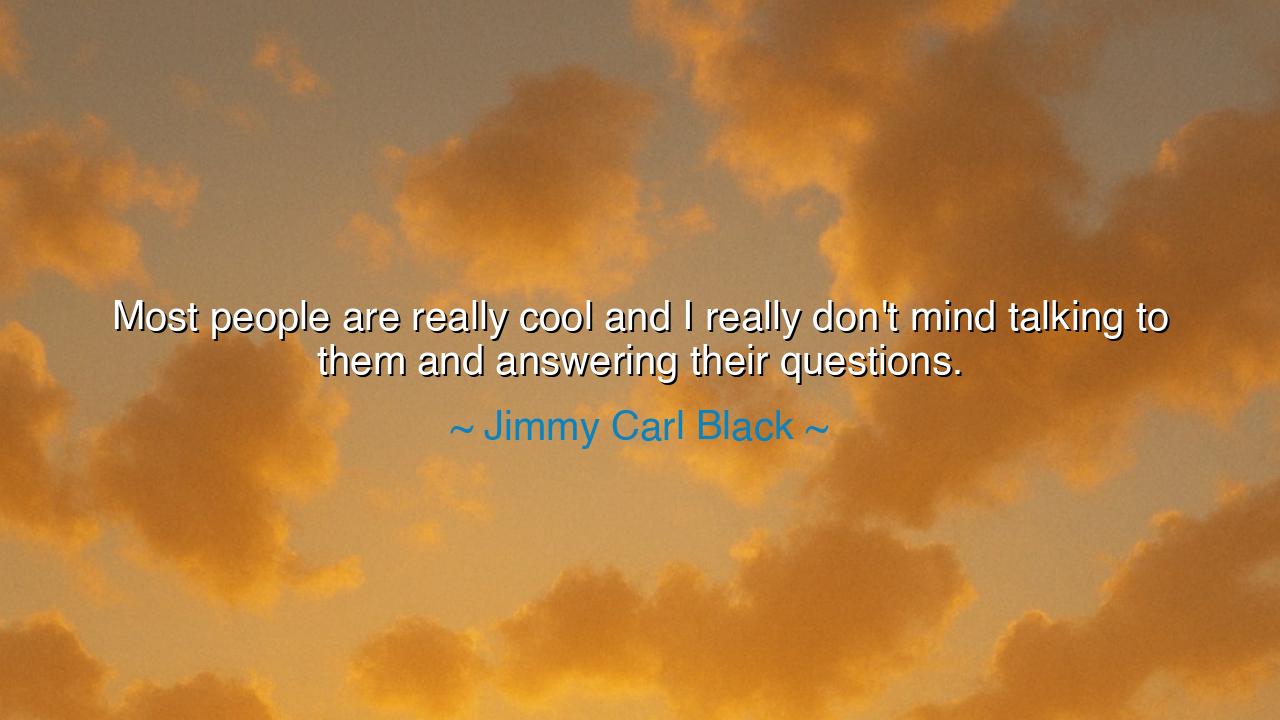
Most people are really cool and I really don't mind talking to
Most people are really cool and I really don't mind talking to them and answering their questions.






In the heart of the human experience lies an often-overlooked truth: that the greatest connection we can share is one built on understanding and openness. Jimmy Carl Black captures this essence when he says, "Most people are really cool and I really don't mind talking to them and answering their questions." His words reflect a profound acceptance of humanity, acknowledging that beneath the surface of all individuals, there exists a shared human experience that connects us. Black’s attitude speaks to the wisdom of empathy and communication, where genuine connections are forged not through distance or judgment, but through a willingness to listen, share, and understand.
In the ancient world, great philosophers and leaders often stressed the importance of engaging with people from all walks of life. Socrates, perhaps the most famous of all, spent his life conversing with people from various stations in society, believing that through dialogue, both wisdom and understanding could be shared. He famously claimed that “the unexamined life is not worth living,” and part of that examination was the dialogue between individuals, where the exchange of ideas could deepen our understanding of both the world and ourselves. Black’s approach to interacting with people is very much in line with this ancient tradition: embracing the opportunity to engage and answer questions not with arrogance, but with an open heart and a spirit of cooperation.
In much the same way, Alexander the Great, though known for his conquests, also valued dialogue and understanding. When he encountered new peoples, he did not simply conquer, but sought to understand and integrate the cultures he came across. It was in these exchanges—these dialogues—that he learned about the strengths of other civilizations and integrated them into his empire, creating a more unified and resilient world. Alexander understood that true greatness did not lie solely in military prowess, but in the ability to engage with others, to listen, and to learn from them. Black’s words about talking to people and answering their questions reflect a similar wisdom: engagement with others is not just about giving, but about receiving and growing together.
The Roman philosopher Seneca echoed this sentiment when he wrote, “We are more often frightened than hurt; and we suffer more in imagination than in reality.” He spoke of how we often create barriers between ourselves and others, assuming that people will be difficult or even hostile, when in reality, most people, as Black suggests, are just “really cool.” The fear of interaction often stems from our own prejudices or insecurities, but when we open ourselves to the world and the people within it, we find that the act of connection is not only possible but enriching. Black embodies this openness in his simple, yet powerful, embrace of the human experience.
Similarly, the great Mahatma Gandhi, whose leadership changed the course of history, believed in the transformative power of compassionate listening. In his early years, Gandhi was not content to simply speak; he listened to the stories and struggles of the people, answering their questions and offering guidance with humility. He recognized that every person, no matter their background or station, has something of value to offer. This is the essence of Black's statement—true wisdom comes not from withholding answers or separating oneself from others, but from engaging deeply with the questions and struggles of the world around us.
The lesson in Jimmy Carl Black’s words is simple yet profound: we must not shy away from connection, from speaking with others and engaging with the challenges they face. Too often, we make assumptions about others based on their appearance or background, or we are reluctant to offer our time and energy. Yet, when we truly listen and respond, as Black does, we create bonds of understanding and mutual respect. Every interaction becomes an opportunity for growth, both for ourselves and for the others we encounter.
In our own lives, we must embrace the spirit of openness and understanding that Black embodies. We must not be quick to judge or avoid the conversations that might challenge us. Instead, let us take a moment to listen, to answer questions, and to see the humanity in those around us. Just as Socrates, Alexander, Gandhi, and others throughout history have demonstrated, true strength lies in our ability to connect with others through dialogue. By choosing to engage fully with the world around us, we too can enrich our lives and the lives of those we meet, creating a ripple effect of wisdom, compassion, and shared understanding.
In this, we find that the act of engaging with others, answering their questions, and listening to their stories is not just an opportunity—it is a privilege, one that can open doors to new understandings, new relationships, and a greater sense of connection with the world around us. Let us embrace these moments with humility, grace, and an open heart, knowing that in doing so, we not only make the world a better place, but we also enrich our own souls along the way.






AAdministratorAdministrator
Welcome, honored guests. Please leave a comment, we will respond soon